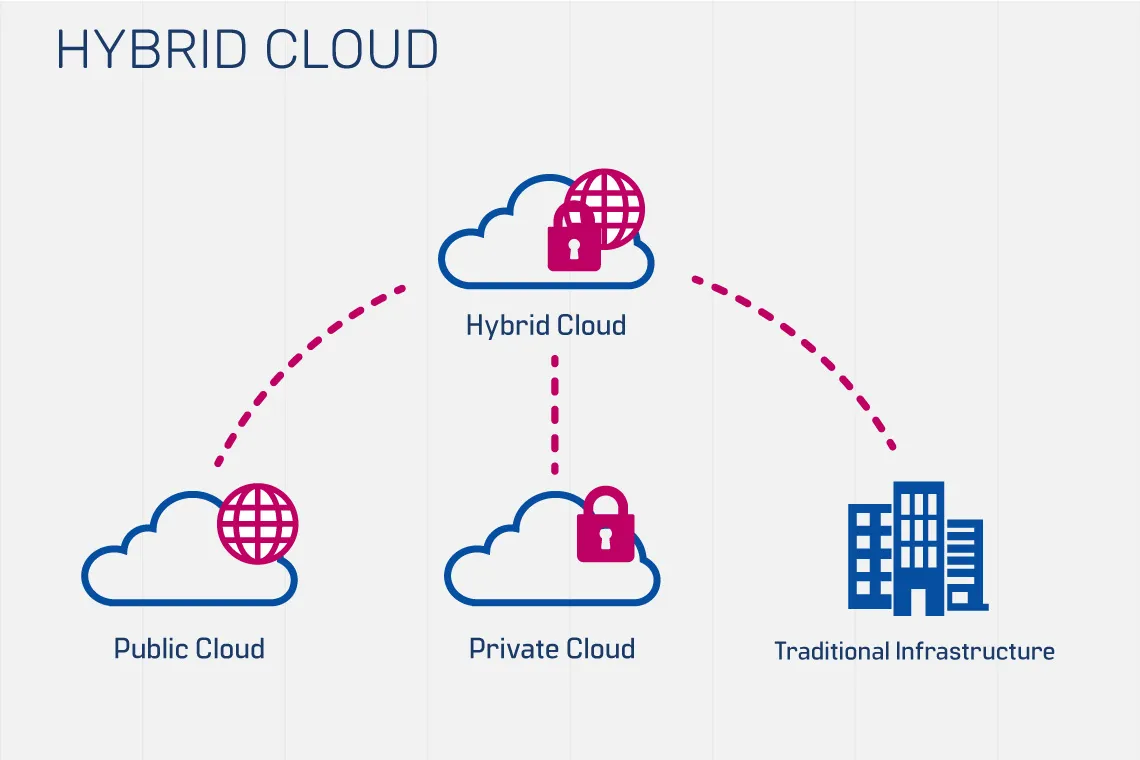In today’s digital age, businesses are increasingly looking for ways to optimize their IT infrastructure while balancing performance, security, and cost. Hybrid Cloud Solutions have emerged as a popular choice for companies seeking the best of both worlds—leveraging the flexibility of public clouds while maintaining control over critical data with private clouds. In this article, we will explore the top benefits of implementing Hybrid Cloud Solutions for your business, helping you understand why this approach is essential for modern enterprises.

1. Increased Flexibility and Scalability with Hybrid Cloud Solutions
One of the most significant advantages of Hybrid Cloud Solutions is the increased flexibility and scalability they offer to businesses. Unlike traditional IT environments, where resources are often limited by physical infrastructure, hybrid cloud solutions enable companies to scale their operations seamlessly.
Benefits of Flexibility and Scalability:
- On-Demand Resources: With a hybrid cloud, you can easily access additional computing resources from the public cloud during peak times, ensuring that your business can handle increased workloads without investing in expensive hardware.
- Customizable Environments: Hybrid cloud solutions allow you to tailor your IT environment to meet specific business needs, combining the strengths of both public and private clouds.
- Efficient Resource Allocation: Businesses can allocate resources dynamically, optimizing performance and reducing costs by utilizing the public cloud for less critical tasks while keeping sensitive data on a private cloud.
2. Enhanced Security and Compliance
Security is a top priority for businesses, especially when dealing with sensitive data. Hybrid Cloud Solutions provide an optimal balance between the security of private clouds and the flexibility of public clouds, making them ideal for companies that must adhere to strict regulatory requirements.
Security Benefits of Hybrid Cloud Solution:
- Data Segmentation: Businesses can store sensitive data in a private cloud with stringent security measures, while non-sensitive data and applications can reside in the public cloud, reducing the risk of data breaches.
- Regulatory Compliance: For industries with strict compliance standards, hybrid cloud solutions offer the ability to keep data in locations that meet specific regulatory requirements, such as GDPR in Europe.
- Improved Risk Management: By combining private and public cloud resources, businesses can create a more resilient IT infrastructure that mitigates the risks associated with single-point failures.
3. Cost Efficiency and Better Resource Utilization
Implementing Hybrid Cloud Solutions can lead to significant cost savings for businesses. By leveraging both public and private clouds, companies can optimize their IT spending, reducing the need for large upfront investments in hardware and software.
Cost Benefits of Hybrid Cloud Solutions:
- Pay-As-You-Go Model: Public cloud services typically operate on a pay-as-you-go basis, allowing businesses to pay only for the resources they use. This model helps in managing costs more effectively.
- Reduced Capital Expenditure: With hybrid cloud solutions, businesses can avoid the high costs associated with building and maintaining an entirely private cloud infrastructure.
- Optimized Workloads: By utilizing public clouds for non-critical workloads, businesses can allocate private cloud resources more effectively, leading to better overall resource utilization and cost management.
4. Improved Business Continuity and Disaster Recovery
Business continuity and disaster recovery are critical considerations for any organization. Hybrid Cloud Solutions provide robust disaster recovery options by combining the strengths of both public and private clouds, ensuring that your business can quickly recover from unexpected disruptions.
Benefits for Business Continuity:
- Redundant Systems: Hybrid cloud solutions allow businesses to create redundant systems across public and private clouds, reducing the risk of data loss in the event of a disaster.
- Faster Recovery Times: By utilizing the scalability of the public cloud, businesses can recover data and applications faster, minimizing downtime and ensuring continuity of operations.
- Automated Backups: Hybrid cloud environments can be configured to automatically back up critical data to the public cloud, providing an additional layer of protection against data loss.
5. Seamless Integration with Existing IT Infrastructure
One of the key challenges businesses face when migrating to the cloud is integrating new cloud solutions with their existing IT infrastructure. Hybrid Cloud Solutions offer seamless integration, enabling businesses to maintain their legacy systems while benefiting from the advantages of cloud computing.
Integration Benefits of Hybrid Cloud Solution:
- Smooth Transition: Hybrid cloud solutions allow businesses to gradually transition to the cloud, reducing the risk of disruption during the migration process.
- Compatibility with Legacy Systems: Companies can continue using their existing on-premises systems while integrating cloud services, ensuring that they get the most out of their current investments.
- Unified Management: Hybrid cloud solutions often come with centralized management tools, allowing IT teams to manage both on-premises and cloud resources from a single interface.
6. Enhanced Innovation and Agility
In a rapidly changing business environment, the ability to innovate and respond to market demands quickly is crucial. Hybrid Cloud Solutions provide the agility needed to deploy new applications and services faster, giving businesses a competitive edge.
Innovation and Agility Benefits:
- Rapid Deployment: Businesses can deploy new applications and services quickly using public cloud resources, without the need for lengthy procurement processes.
- Scalable Testing Environments: Hybrid cloud solutions enable businesses to create scalable testing environments, allowing for rapid development and iteration of new products and services.
- Faster Time-to-Market: By leveraging the flexibility and scalability of hybrid clouds, companies can bring new offerings to market faster, responding more effectively to customer needs.
7. Support for Remote and Distributed Workforces
As remote work becomes increasingly common, businesses need solutions that can support a distributed workforce. Hybrid Cloud Solutions provide the infrastructure needed to ensure that employees can access the tools and data they need, regardless of their location.
Benefits for Remote Work:
- Secure Access: Hybrid cloud solutions offer secure access to company resources, ensuring that remote workers can collaborate effectively without compromising security.
- Scalability for Remote Access: With hybrid cloud solutions, businesses can scale their remote access capabilities to accommodate a growing remote workforce.
- Centralized Collaboration Tools: By integrating cloud-based collaboration tools, hybrid cloud solutions enable seamless communication and collaboration among distributed teams.
8. Competitive Advantage and Future-Proofing
Implementing Hybrid Cloud Solutions not only provides immediate benefits but also positions your business for long-term success. By adopting a hybrid cloud strategy, companies can stay ahead of the competition and adapt to future technological advancements.
Competitive Advantages:
- Adapting to Market Changes: Hybrid cloud solutions offer the flexibility needed to quickly adapt to changing market conditions, giving businesses a competitive edge.
- Leveraging Advanced Technologies: By integrating hybrid cloud solutions, businesses can take advantage of emerging technologies such as AI, machine learning, and big data analytics.
- Future-Proofing IT Infrastructure: Hybrid cloud solutions provide a scalable and flexible IT infrastructure that can grow and evolve with your business, ensuring long-term success.
Conclusion: Embrace the Future with Hybrid Cloud Solutions
Incorporating Hybrid Cloud Solutions into your business strategy offers a wide range of benefits, from enhanced security and cost efficiency to improved scalability and innovation. By leveraging the strengths of both public and private clouds, your business can stay competitive, secure, and agile in a rapidly changing digital landscape.
For businesses looking to maximize their IT potential while maintaining control and flexibility, Hybrid Cloud Solutions are the ideal choice. Start exploring hybrid cloud options today to future-proof your business and gain a competitive advantage in the marketplace.
